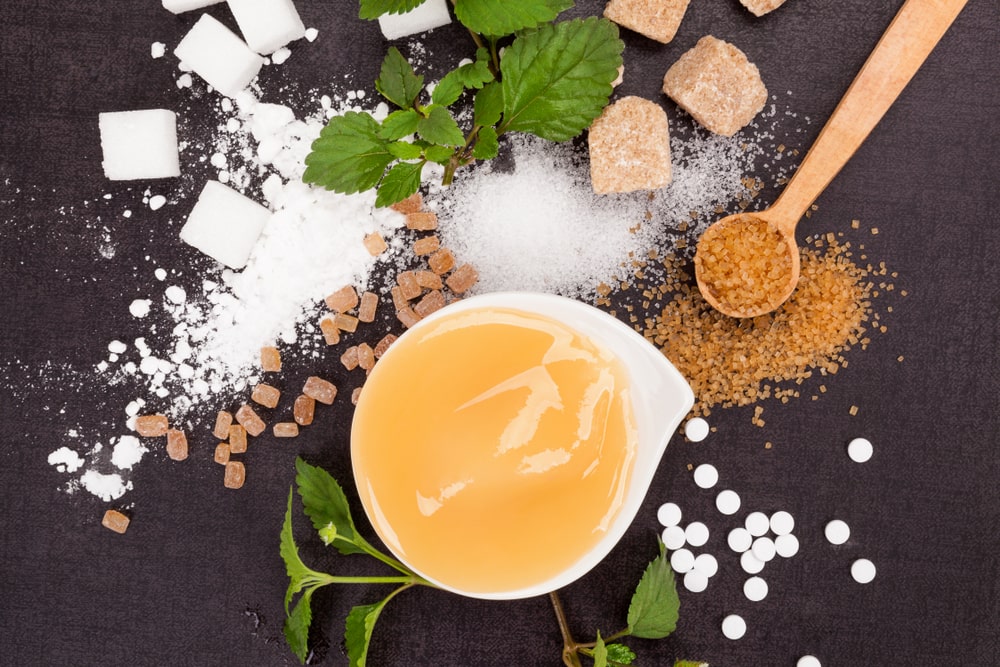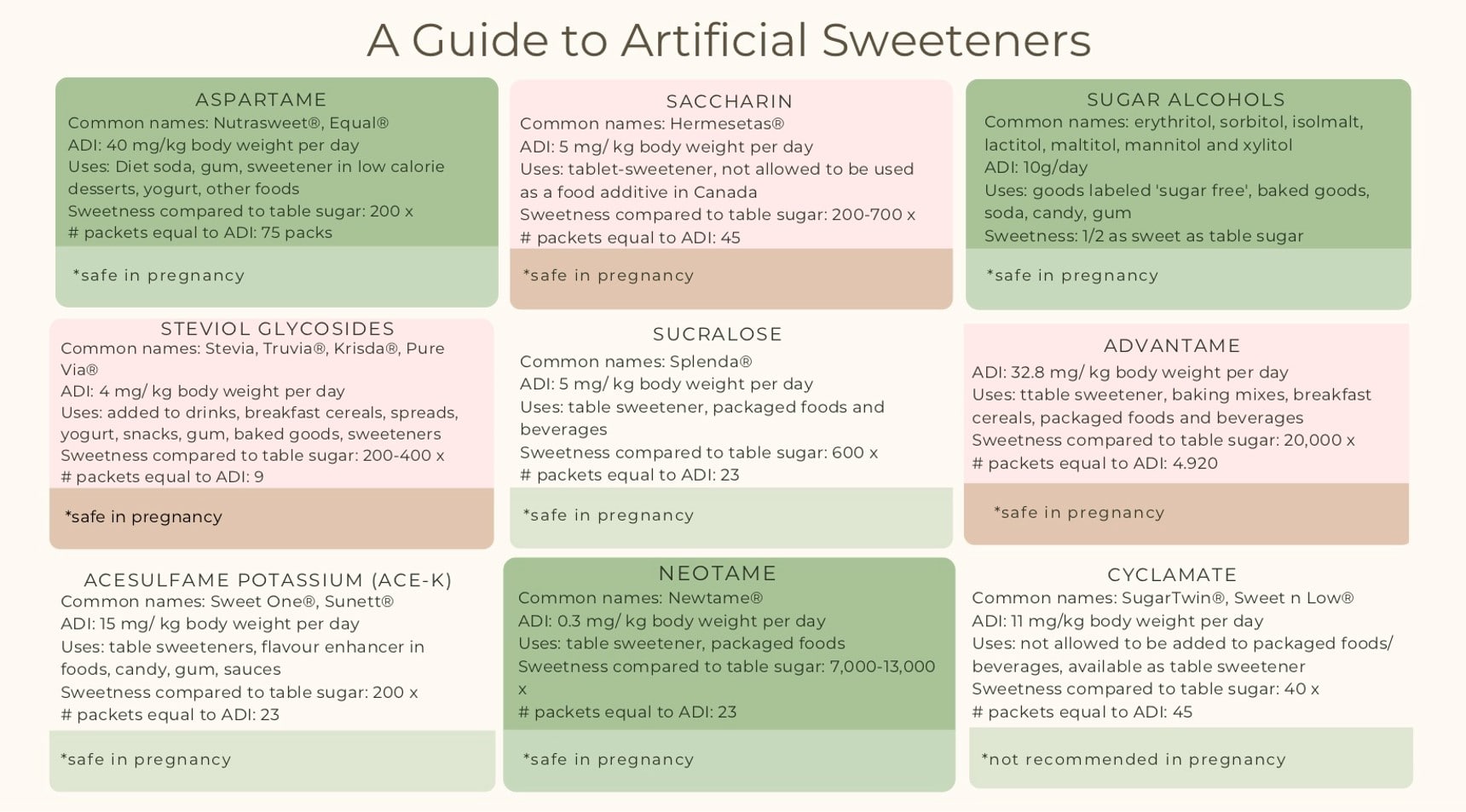4 Things to Know About the Safety of Artificial Sweeteners
by Marissa Frodsham

Have you ever wondered how safe sugar substitutes are? There has been a lot of controversy on the safety of artificial sweeteners as several diet products emerge.
Keep reading to learn about the 4 things you should know about the safety of artificial sweeteners, with some input from Registered Dietitian and Certified Diabetes Educator Sofia Kalamaris RD, CDE.
What are artificial sweeteners?
Let’s first explore the large category of ‘sugar substitutes.’ Sugar substitutes are food additives that mimic the taste of sugar.
Artificial sweeteners can be divided into ‘nutritive’ sweeteners (those containing calories) and ‘non-nutritive’ sweeteners (those with no calories).
Artificial sweeteners with calories include sugar alcohols, which are similar to sucrose (table sugar) in sweetness. Have you ever wondered why sugar packets are larger than sweetener packets? The calorie-free artificial sweeteners are of a different chemical and are 30-13,000 times sweeter than sucrose.

What are artificial sweeteners used for?
They are used for “diet” or “sugar-free products”. Sugar-free products have become more popular because they have a lower caloric content and may prevent dental caries (cavities).
You can find sweeteners in syrups, sodas, breakfast cereals, spreads, baked goods, yogurt, protein and snack bars, and a variety of other packaged foods. You can also find many of these sweeteners in the packets that you add to coffee and tea.
People may prefer these sugar-free products because they can enjoy something sweet, with lower caloric content. Another feature of some artificial sweeteners is that they do not raise blood sugar levels, helping individuals with diabetes maintain stable blood sugar levels.
However, regarding how useful artificial sweeteners are for blood sugar management, Sofia RD, CDE pointed out that they can “be useful, but we (Dietitians) can provide education as well because other things in sugar-free products can raise blood sugar, such as (the overall carbohydrate content in a) sugar-free cookie, so we focus on looking at the bigger picture finding ways to incorporate sweets if that is what someone wants”.

Types and brands of artificial sweeteners
The ingredient list on food can get a little complicated, so to help break down some common artificial sweeteners, we have provided a poster below based on information from the FDA.
Before these sweeteners are sold or used, they undergo a rigorous safety assessment. Health Canada has a tightly controlled list of permitted sweeteners and an established Acceptable Daily Intake level (ADI). The ADI represents the maximum amount of a substance that can be consumed daily over a lifetime without adverse effects.

Here are 4 things you need to know about the safety of artificial sweeteners
1. They must be approved under the Food and Drugs Act and Regulations (FDAR)
Before sugar substitutes can be added to foods and beverages in Canada, they are subject to safety tests and controlled under the Food and Drugs Act and Regulations (FDAR). The purpose of use for each sweetener is evaluated, and studies are continuously reviewed to prioritize the health and safety of consumers.
2. There are recommended uses and quantities for each
Health Canada outlines the permitted uses of each sweetener:
Cyclamate (Sugar Twin ®, Sweet n Low ®) is not permitted as a food additive in Canada, only as a table sweetener.
Saccharin (Hermestas ®) is also not permitted to be added to packaged foods and beverages and can only be sold as a table sweetener.
If you are concerned about the number of artificial sweeteners you are consuming, check the Acceptable Daily Intake level (ADI) for each sweetener in the infographic above. Health Canada also provides this information, as well as the FDA in the USA.
We know all of this can be confusing, but a Dietitian can help develop a better idea of how you can incorporate sweeteners into your life within a safe limit.
“We evaluate how much sweetener an individual is having because different sweeteners have recommended daily allowances. We also like to make sure that sweeteners aren’t taking away from other things in the diet, and we caution that too much may have side effects like gastrointestinal upset”. – Sofia Kalamaris RD, CDE
3. Some sweeteners are not safe for everyone
Health Canada also considers vulnerable parts of the population (pregnant women, infants, and children) when evaluating the safety of artificial sweeteners, as they may be more likely to experience adverse effects.
Some sweeteners should not be consumed by certain groups of people. Cyclamate is not recommended in pregnancy; however, other artificial sweeteners have been established to be safe for consumption in pregnancy.
In a review of artificial sweeteners conducted by Dietitians of Canada, pregnant and breastfeeding women are advised to consume sugar substitutes in moderation. There is limited research on the safety of artificial sweeteners for children. It is recommended that children and infants avoid sweeteners because they are not a suitable replacement for more nutritious foods.
If you have phenylketonuria (PKU) it is important to read the ingredient list and avoid the consumption of aspartame as it contains phenylalanine.
4. Moderation is key
You have probably heard it before, but it is worth repeating that everything in moderation is a good rule of thumb. Artificial sweeteners and sugar alcohols are perfectly safe to consume in moderation.
If consumed in excess, you may experience some digestive discomfort, some are not absorbed or fully digested.
So, what is the controversy?
Although it is safe to consume artificial sweeteners, scientists have debated if they pose health risks. Research is still exploring the relationship between artificial sweeteners and weight gain, altered taste receptors, and impacts on gut bacteria.
Some studies have found a relationship between the consumption of artificial sweeteners and weight gain. This may be because artificial sweeteners do not provide the same satiety response in the body as natural sugars, leading to continued consumption.
“I look at the bigger picture, taking a more holistic approach, completely avoiding sugar can lead to cravings, if someone is wanting to add flavour or is looking for something that tastes sweeter, we can find alternatives or educate them on how to incorporate sweets into their diet”. – Sofia Kalamaris RD, CDE
Key Takeaways
So, what is the verdict on artificial sweeteners? They are safe to consume, but the key message is to enjoy them in moderation. They can be a part of a balanced diet but should not be used as a replacement for nutritious foods.
If you have concerns about artificial sweeteners or are interested in developing a nutrition care plan to reach your health goals, a Dietitian can help! Head to our directory to connect with a Registered Dietitian near you!
About the RD
Sofia Kalamaris, RD, CDE
Sofia is a registered dietitian passionate about promoting healthy lifestyles, and helping individuals achieve their health goals by making lasting lifestyle changes. She has extensive knowledge in eating disorders, Diabetes and metabolic disorders, and many other areas such as weight inclusive and mindful eating techniques. Head to the Dietitian Directory for Sofia’s contact information or find her on Instagram here.
About the Author: Marissa is a third-year nutrition student at Toronto Metropolitan University pursuing a career as a Registered Dietitian.
Reviewed by: Lindsey McGregor, RD and Hannah Jackson
Images from Unsplash and Pexels
The Site is not intended to be a substitute for professional advice. Under no circumstances will we be liable for any loss or damage caused by your reliance on information obtained through the Site. It is your responsibility to evaluate the accuracy, completeness or usefulness of any information, opinion, advice or other content available through the Site. Please seek the advice of professionals, as appropriate, regarding the evaluation of any specific information, opinion, advice or other content. Never disregard professional advice, including medical advice, or delay in seeking it, because of something you have read on this Site.



